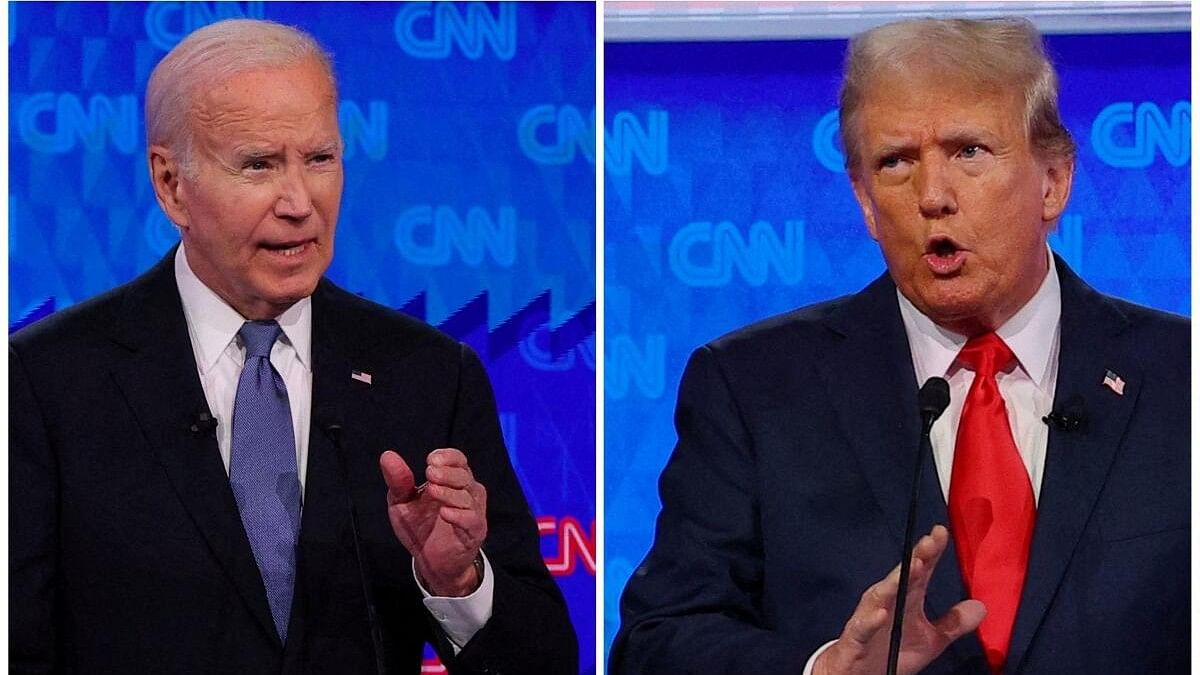
Democratic Party presidential candidate US President Joe Biden and Republican presidential candidate former US President Donald Trump speak during a presidential debate in Atlanta, Georgia.
Credit: Reuters Photo
By Gregory Korte
Democrats have ways to replace Joe Biden at the top of their presidential ticket after a harrowing debate against Republican Donald Trump — but doing so without their standard-bearer’s acquiescence would be a daunting task.
Party members once united behind Biden are now scouring candidate resumes and researching rules for a contingency plan to present voters with a different nominee after a universally panned performance Thursday night cemented worries about the president’s ability to serve a second term.
"The easiest one is, Biden takes himself out of the race,” said Elaine Kamarck, a Democratic National Committee member and author of a book about the presidential nominating process. “Then yes, there’s rules and procedures and the party would replace him.”
While pushing Biden off the ticket is possible, the lack of an obvious candidate to replace him makes such a gambit all the more unlikely, Kamarck said.
Earlier: Biden Says He’ll Continue 2024 Run, Rebuffing Calls to Quit
The debate saw months of Democratic anxiety over Biden, already the oldest US president in history at 81, and his prospects for defeating Trump, boil over. The president Friday acknowledged the limitations of his debate showing but dismissed calls to exit the race.
Delegate Revolt
If Biden doesn’t step aside, forcing him out would be a Herculean undertaking for Democrats.
Any rival would first have to collect 600 delegate signatures on a petition to place his or her name in nomination at the Democratic convention — with no more than 50 signatures from any one state. That’s about 13% of the delegates. But with Biden controlling 99% of the pledged delegates, that would require challengers convincing Biden loyalists to flip their support.
“The odds are not insurmountable, but they’re very high for any scenario that involves a delegate revolt,” said Josh Putnam of FHQ Strategies, a non-partisan consulting firm specializing in delegate selection rules.
“More often than not these are pretty fervent Biden supporters,” Putnam said of the delegates.
The Biden campaign has vetted his convention delegates for their loyalty, but they do have room to change their minds. Unlike Republican delegates, who are often legally bound to cast their vote for a particular candidate, Democratic rules say only that pledged delegates “shall in all good conscience reflect the sentiments of those who elected them.”
Still it’s the kind of move most politicians wouldn’t attempt unless success were guaranteed. Challengers who fail to oust an incumbent president from the ticket risk becoming party pariahs.
“This is not something that a lot of people could pull off,” said Kamarck.
Open Convention
A move to change the ticket — whether Biden agrees to go willingly or is pushed out — would bring a convention free-for-all not seen for decades.
In an “open” or “brokered” convention, no candidate comes into the roll-call vote with enough delegates to be guaranteed the nomination. Voting could last any number of rounds until a candidate wins.
Such a convention would also put so-called “super-delegates” in the spotlight. Those delegates — leaders and elected officials who get to the convention by virtue of their position — have been stripped of some powers in recent years as the party worried their influence in the process was undemocratic. But if a nomination goes into a second ballot, those automatic delegates, who number more than 700, could sway the convention.
Another wild card is that the party is free to change its rules at any time before the nomination, potentially lowering or raising the bar for a Biden challenger.
The most obvious heir apparent is Vice President Kamala Harris — but Democrats don’t have to pick Biden’s running mate. Some of the most discussed alternatives include Governors Gavin Newsom of California, JB Pritzker of Illinois and Gretchen Whitmer of Michigan, all of whom say they still support Biden.
The nomination vote was scheduled for August 21, but the DNC has raised the possibility of a virtual roll call before August 7 to accommodate early ballot deadlines.
Eleventh Hour
If Biden steps aside after the convention, the decision on how to replace him would be up to a smaller group: The more than 400 members of the DNC. By party rules, the DNC chairman would consult with Democratic congressional leaders and governors and make a recommendation.
Democrats last used that process in 1972 to replace Thomas Eagleton, the vice presidential nominee forced off the ballot after acknowledging that he had received electroshock therapy for depression, with Sargent Shriver.
But a late switch could present Democrats with another problem: Ballot deadlines. Some states, including battlegrounds Pennsylvania and North Carolina, allow ballots to be mailed out as early as two months before Election Day, meaning Biden’s name would continue to appear even if he’s not the candidate.
One advantage of the Electoral College system is those votes would still count, Kamarck said.
“We don’t really vote for president. We vote for electors to president,” she said. “It’s the same electors no matter who’s at the top of the ballot.”